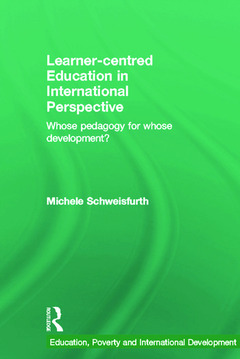Description
Learner-centred Education in International Perspective
Whose pedagogy for whose development?
Education, Poverty and International Development Series
Author: Schweisfurth Michele
Language: English
Subjects for Learner-centred Education in International Perspective:
Keywords
emancipatory; narrative; preparation; pedagogical; nexus; developing; countries; problem-based; learning; suzhi; Suzhi Jiaoyu; Material Resource Constraints; UNICEF UK; TIMSS Sample; Vice Versa; High Stakes Assessment Regimes; UNDP 2010a; Human Development Index; LCE; Bird’s Eye; Professional Development; Final Lesson; Pedagogical Nexus; UK University; UN; Problem Based Learning; Pedagogical Border Crossers; Education System; Homes Run; Violated; Cfs; Lived Classroom Experiences; Rhetoric Practice Gaps; Teacher Professional Identity; Preparation Narrative
178.41 €
In Print (Delivery period: 14 days).
Add to cartPublication date: 03-2013
Support: Print on demand
Approximative price 61.25 €
In Print (Delivery period: 14 days).
Add to cartPublication date: 06-2015
· 15.6x23.4 cm · Paperback
Description
/li>Contents
/li>Readership
/li>Biography
/li>
Is learner-centred education appropriate for all societies and classrooms?
Learner-centred education (LCE) is a travelling policy, widely promoted by international agencies and national governments. Arguments in favour of this pedagogical tradition refer to theories and evidence from cognitive psychology, claiming that all learners can benefit equally from its judicious use. Beyond the benefits to the individual however, lie a set of assumptions about learner-centred education as a foundation for the building of democratic citizens and societies, suitable for economies of the future. These promises have been questioned by critics who doubt that it is appropriate in all cultural and resource contexts, and there is considerable evidence in the global South of perennial problems of implementation.
In the light of these debates, is LCE still a good development ?bet?? This book provides an authoritative and balanced investigation of these issues, exploring the contextual factors from global movements to local resourcing realities which have fuelled it as a discourse and affected its practice. In the light of the theoretical underpinnings and research evidence, the book addresses pressing questions: to what extent is learner-centred education a sound choice for policy and practice in developing countries? And if it is a sound choice, under which conditions is it a viable one?
The book is divided into three key parts:
- Learner-centred Education as a Global Phenomenon
- Learner-centred Education in Lower and Middle-income Countries
- Lessons and Resolutions
This bookprovides a much-needed fresh analysis of the concept and practice of LCE. It will be valuable reading for academics and post-graduates with a focus on comparative and international education, along with policy-makers in developing countries and development agencies.
1. Introduction Part I: Learner-centred Education as a Global Phenomenon 2. Learner-centred Education: Definitions and Provenance 3. Three Justificatory Narratives: Cognition, Emancipation and Preparation 4. Contexts for Learner-centred Education: Global, National and Local Part II: Learner-centred Education in Lower and Middle-income Countries 5. Learner-centred Education as a Promising but Problematic Policy in the Global South 6. The Gambia: The Intersection of the Global and the Local in a Small Developing Country 7. Moving Towards Learner-centred Education: China’s Multiple Paradoxes 8. Russia - Shifting and Resilient Narratives on the ‘Educated Person’ 9. South Africa’s Emancipatory Policy Discourses and Classroom Realities 10. Mobile Students and New Learner-centred Pedagogies Part III: Lessons and Resolutions 11. Ten Key Lessons from Theory, Evidence and Cases 12. Towards a Contextualised Learner-centred Pedagogical Nexus
Michele Schweisfurth is Chair in Comparative and International Education at the School of Education, University of Glasgow. She is also the editor of the journal Comparative Education.
These books may interest you

Learning and Teaching Around the WorldComparative and International Studies in Primary Education 66.48 €

Learning and Teaching Around the WorldComparative and International Studies in Primary Education 209.69 €

Child-Centred Education 88.32 €

